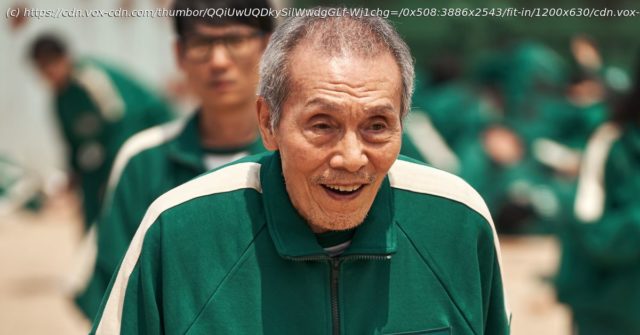A Korean film scholar/filmmaker breaks down the Squid Game themes.
By any measure, Netflix’s Squid Game is a runaway hit. The Korean drama-slash-horror series about a battle royale conducted via children’s playground games — think Red Light, Green Light or tug of war but with a lot more blood — debuted on September 17 and became an instant sensation, rocketing to the top of Netflix’s most-viewed releases and generating memes across social media. After barely three weeks on the platform, Squid Game has not only become the most popular Korean drama in Netflix’s history, but it’s on track to surpass Bridgerton as the most popular show in Netflix history. Squid Game ’s success is such a fantastic payoff for Netflix’s decision to invest $500 million in Korean entertainment in 2021 that it is causing the company’s stock to boom. That might be somewhat ironic given that Squid Game is all about socioeconomic divides, the exploitation of the poor by the rich, and the desperation of Korea’s financially destitute class of laid-off workers. Creator Hwang Dong-hyuk came up with the idea for the show after years spent reading manga and manhwa (Japanese and Korean comics, respectively) with similar themes, including the influential horror satire Battle Royale, which kicked off the contemporary trend of ensemble casts battling each other to the death in elaborate high-stakes gaming arenas. He paired these concerns with the Korean entertainment industry’s ongoing interest in the socioeconomic plight of a growing number of downwardly mobile workers, once solidly middle class, who’ve found themselves forced into lower-paying jobs due to Korea’s changing economy and decreasing reliance on industry. That plight applies directly to Squid Game ’s main character, Seong Gi-hun. Gi-hun is a divorced dad who worked at an auto factory for years, was laid off, tried to open his own business, failed, and now lives with his elderly mother while working as a chauffeur. When we first meet him, he’s stealing what little money she earns from working at a market stall and racking up a hopeless amount of debt through gambling. Gi-hun’s desperation makes him a prime target for a mysterious organization that offers him a chance to win a massive amount of money — ultimately around $38 million in USD — by playing a series of games with a group of other people, with deadly consequences. As the series progresses through its nine episodes, his drive to win the game allows him to shake off his downtrodden malaise, though he also struggles to retain his humanity despite the game’s most dehumanizing effects. With a plot that mingles satire and melodrama, Squid Game is also arguably allegorical, using its themes and characters to navigate the impact of capitalism on modern society. While it lacks the “prestige drama” veneer of other well-received Korean narratives about class divides and capitalist waste — think Snowpiercer or Parasite — Squid Game has all the characteristics of a typical Korean drama. K-dramas have become hugely popular and well-known for delivering tight, twisty, genre-savvy series in bingeable formats, often with a double dose of intense emotionality and socially conscious themes. Combine all that with Squid Game ’s capitalist critique and the easy accessibility of a show on Netflix, and you have a recipe for a hit. Squid Game memes have overtaken wide swaths of the internet, reactions to the show are everywhere, and international viewers have taken to analyzing how faithful the localized subtitles are to the original Korean. By any stretch, given the number of Americans who scoffed at the thought of reading subtitles for Best Picture-winning Parasite less than two years ago, Squid Game ’s immediate cultural ascendancy is an arguable win for international media. And while the show’s high levels of violence might mean many people steer clear of it, its status as a major hit means its repudiation of greed and classism are worth understanding. To help me unpack how all of these factors manifest in a show about children’s games that can kill you, I turned to Kyung Hyun Kim, a filmmaker and professor of visual and East Asian studies at the University of California Irvine. We discussed his initial revulsion at the show’s premise, how American and Korean storytelling tropes tend to diverge when characters are facing death, and how Squid Game taps into South Korean socioeconomic anxiety. Our conversation, lightly edited for length and clarity, is below. Spoilers for Squid Game follow. So what was your initial impression of Squid Game? When I first started watching it, I was disgusted because it felt to me a violation of a certain kind of an innocent memory that I’ve got. Hwang Dong-hyuk, the director and writer, is basically the same age as me. Hwang is 50 years old. I came to the US when I was age 9 or 10, so I remember all of these games that are featured in the drama. I know my memories are very fond and intimate, and then to use it in such a violent way — not the violence itself, because I don’t get scared with the gory and bloody stuff — that felt to me like a violation. Of a certain kind of, I dunno, fondness and intimacy that you built surrounding these games. I suspect the director wanted to evoke that kind of response. Yeah. That’s the intention, right, that there is a certain notion of innocence that is being trampled upon. You can’t let go, you still cling on to those memories, and I think these memories of your youth and innocence are now obviously kind of permanently stained. So there’s that. But I get it. The end [of the series], I think, is trying to tell a moral tale that is probably not that different from something like Parasite that is basically a film that tries to critique the effects of new liberal capitalism and the violence and the ruthlessness and the cruelty that is associated with it.






